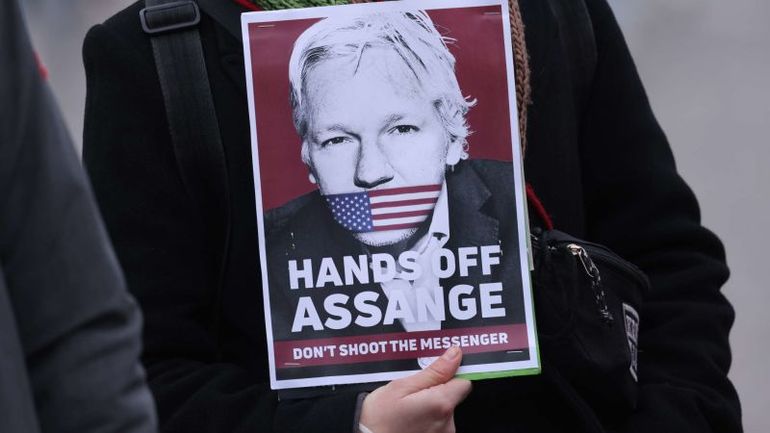
Biden Considers Australian Request to Halt Julian Assange Prosecution

President Joe Biden discusses the possibility of honoring Australia's plea to cease the prosecution of Wikileaks founder Julian Assange during a White House briefing on Wednesday.
President Joe Biden shared with reporters at the White House on Wednesday that his administration is currently reviewing a request made by Australia to dismiss charges against Wikileaks founder Julian Assange.
Back in February, the Australian Parliament passed a motion advocating for Assange to be returned to his home country of Australia.
Biden responded to Australia's request to stop Assange's prosecution by saying, "We're considering it." The National Security Council has been contacted by CNN for further comment on the president's statement.
US officials claim that Assange, 52, endangered lives by releasing classified military information. They have been trying to extradite him on charges of espionage for many years. Assange is wanted by the US for publishing confidential military files provided by Chelsea Manning, a former Army intelligence analyst, in 2010 and 2011.
In 2019, Julian Assange was charged by prosecutors in Virginia with 18 offenses. These charges included one count of conspiracy to attempt to hack a computer, in relation to the 2010 release of classified military material obtained through Chelsea Manning. Additionally, Assange faced 17 more counts under the Espionage Act.
The prosecution claims that Assange encouraged Manning to acquire a large amount of unfiltered US diplomatic cables. These cables potentially put confidential sources at risk, as well as contained significant reports on activities in Iraq and information regarding Guantanamo Bay detainees.
Each count against Assange has a maximum sentence of 10 years. If found guilty, he could face a total of 175 years in prison.
Assange has been resisting extradition for the past five years while being held at London's Belmarsh prison. Prior to that, he spent seven years seeking refuge as a political exile at the Ecuadorian embassy in the UK. His situation has drawn criticism from supporters of free speech, who argue that his extradition could set a dangerous precedent for press freedom.
Last month, Julian Assange fought off the immediate threat of extradition during a hearing in London, where he is currently detained.
Assange requested permission to appeal the UK's approval of his extradition in 2022. He argued that the case against him was politically motivated and expressed concerns about not receiving a fair trial. Two judges on the panel ruled that Assange, an Australian citizen, would not be extradited right away. They gave the US three weeks to provide assurances regarding Assange's First Amendment rights and confirmed that he would not face the death penalty.
If the US does not provide these, Assange can appeal his extradition at a hearing in May. This ruling could be a lifeline for Assange in a long saga where he gained global attention for exposing what he called "convincing evidence of war crimes" by US-led coalition and Iraqi government forces.
Editor's P/S:
The Biden administration's review of Australia's request to dismiss charges against Julian Assange is a complex and politically charged issue. Assange, the founder of WikiLeaks, is wanted by the US for publishing classified military files provided by Chelsea Manning in 2010 and 2011. The US claims that Assange endangered lives by releasing this information, while supporters argue that his extradition could set a dangerous precedent for press freedom.
If the US does not provide assurances regarding Assange's First Amendment rights and his treatment in prison, he could appeal his extradition at a hearing in May. This ruling could be a lifeline for Assange, who has been fighting extradition for the past five years. The case has drawn international attention and raised important questions about the limits of press freedom in the digital age.











